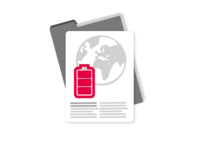1. Inspection of documents based on components certificates
By an inspection of documents take-e-way quickly examines whether certificates submitted by producers are consistent with the products delivered.
2. RoHS Screening (RFA method)
The screening by the accredited partners of take-e-way provides information about pollutants in the product according to RoHS. Here, the latest generation of stationary and mobile analysis equipment is used. Thus, measurements are made on site. With this method, you can get a quick overview already in the incoming inspection or preliminary studies.
3. Chemical analysis
In case of abnormalities or near threshold a low-cost RFA screening can be used to analyse and determine the actual concentrations. The latest mass spectrometer (GC-MS and ICP-MS) are available for this.
RoHS – Restriction of the use of certain hazardous substances in electrical and electronic equipment
RoHS: On 27 January 2003, the European Parliament and Council published the Directive 2002/95/EC on the restriction of certain hazardous substances in electrical and electronic equipment. The Directive was implemented in the Member States within the European Union into national law and is collectively designated as "RoHS" (Restriction of the use of certain hazardous substances). In Germany, the Electrical and Electronic Equipment Act of 16 March 2005 also includes the RoHS Directive.
The goal of RoHS is to restrict and regulate the use of harmful substances in certain equipment and components. Environmental and health hazardous or even toxic substances which can be removed only with difficulty, should be banished from the products.
Therefore, it is since 1 July 2006 banned under RoHS Directive 2002/95/EC to bring new electronic equipment containing more than 0.1 percent
Lead (Pb)
Mercury (Hg)
hexavalent chromium (Cr(VI))
polybrominated biphenyl as flame retardants (PBB)
polybrominated diphenyl ethers as flame retardants (PBDEs)
or containing more than 0.01 weight percent cadmium (Cd) in homogeneous materials. These limits do not apply to the product or components, but to the set "homogeneous material".
Affected producers, importers and retailers must ensure that they comply with the RoHS Directive.
Tests for harmful substances according to WEEE (ElektroG)/RoHS
Together with accredited test institutes take-e-way offers specifically tailored RoHS testing especially for traders and retailers. The investigations are carried out according to the IEC 62321 Ed.1 to create an international comparability of the results. Due to special pre-tests take-e-way can guarantee the cost effectiveness of the tests. take-e-way offers producers or distributors different services to comply with the RoHS Directive.
